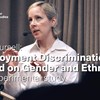based
Fairness-based retributivism reconsidered
Criminal Law & Philosophy, pp. 1-18, Online först. Abstract In this paper, I defend fairness-based retributivism against two important objections, the no-benefit objection and the social injustice o

Claim-based distributive theories
The overarching purpose of this project is to present a framework for claim-based distributive theories. Since scarcity is a ubiquitous societal problem, the project has wide-reaching relevance for society.
Evidence-based policy - challenges and possibilities
This conference is organized by the Institute for futures studies in cooperation with the Network for evidence-based policy, a Swedish network of academics, journalists and civil servants concerned wi

Employment Discrimination Based on Gender and Ethnicity
The study contributes to knowledge about the process behind gender segregation in the labor market. Segregation may be seen as generated by the combined outcome of decisions located at the supply side
Theoretically and empirically informed agent-based models
Johan Koskinen, University of Manchester Theoretically and empirically informed agent-based models and how it may be employed in Social Science.
Consumption-based emissions accounting: the normative debate
Environmental Politics, published online doi.org/10.1080/09644016.2018.1507467 Abstract The normative debate surrounding consumption-based emissions accounting, conceived of as a method for constructing
Pitcovski’s explanation-based account of harm
Philosophical Studies Abstract In a recent article in this journal, Eli Pitcovski puts forward a novel, explanation-based account of harm. We seek to show that Pitcovski’s account, and his arguments in
Population Ethics and Different-Number-Based Imprecision
Theoria, Volume 82, Issue 2,p. 166–181,May 2016. DOI: 10.1111/theo.12094 Abstract Recently, in his Rolf Schock Prize Lecture, Derek Parfit has suggested a novel way of avoiding the Repugnant Conclusion
The Origin of Status Inequality: A Simulation-Based Study
Gianluca Manzo, Sociology Sorbonne Status hierarchies have the characteristic of being increasingly asymmetric distributions that, however, never turn into winner-take-all structures. In this paper we
Agent-Based Modeling and Techno-Social Systems
Advances in Complex Systems, Vol. 16, Nos. 4 & 5, World Scientific Publishing Company. DOI: 10.1142/S0219525913030021








